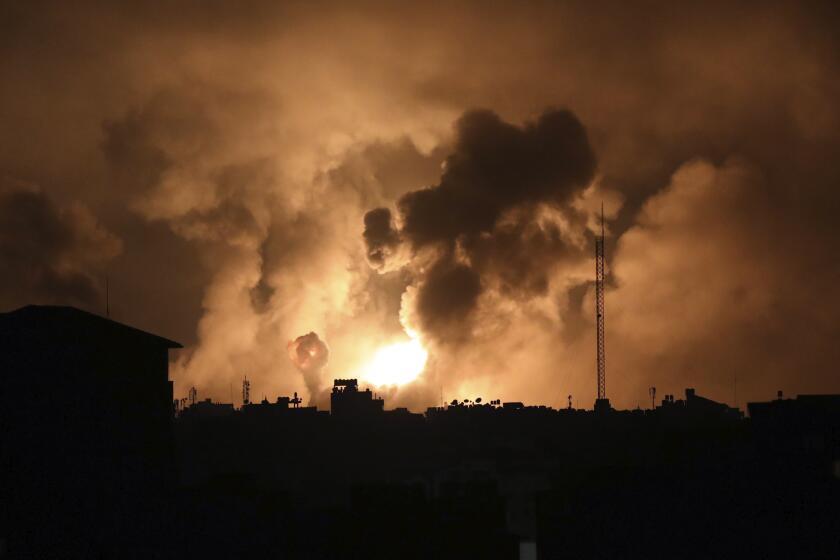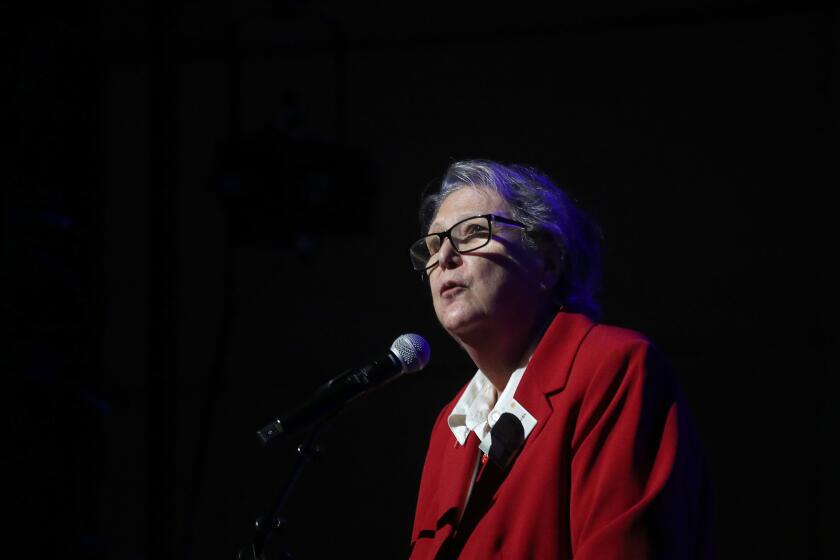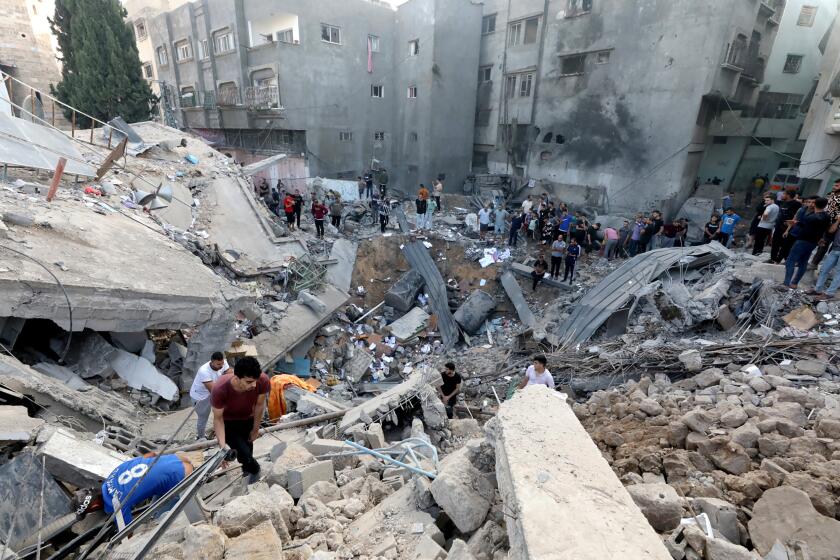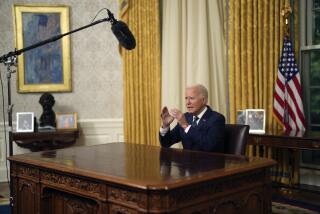Opinion: Arab, Palestinian and Muslim Americans are being targeted. Why isn’t Biden listening to our pleas?
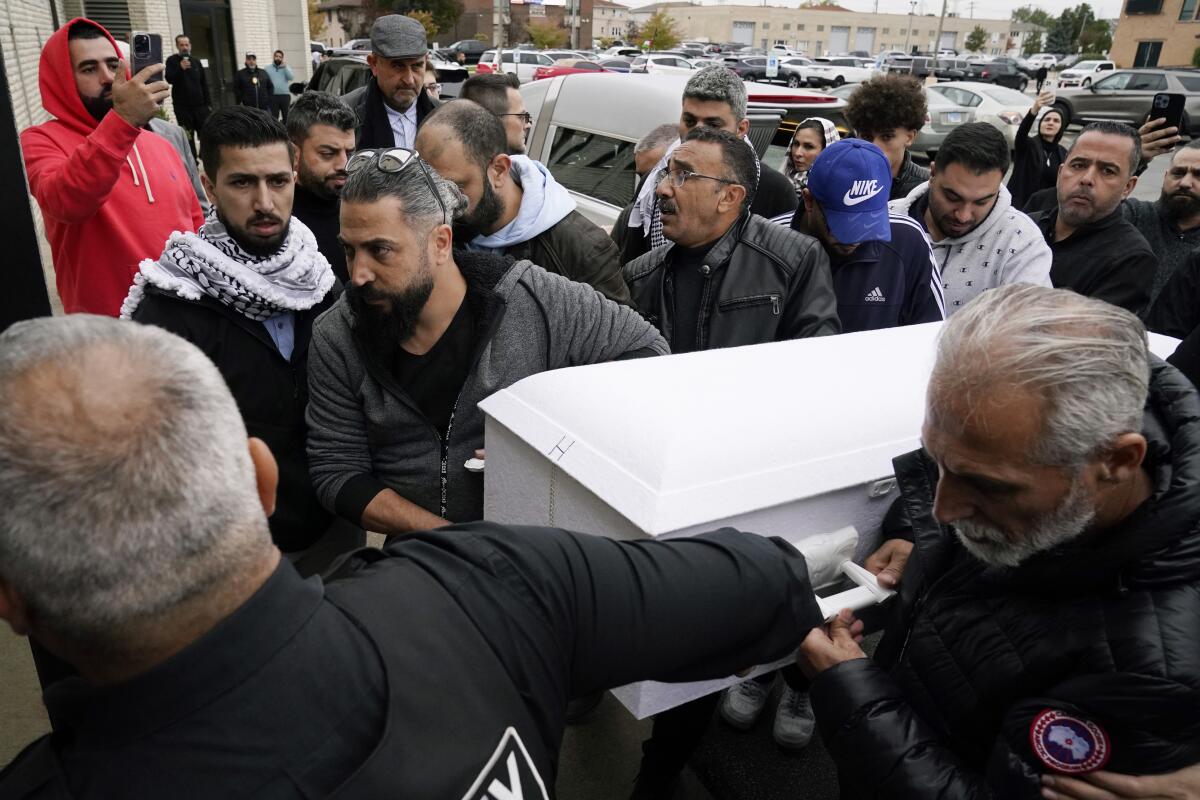
The heart-wrenching murder of 6-year-old Wadea Al-Fayoume in suburban Chicago on Oct. 14, targeted for his Palestinian heritage and Muslim faith, sent shockwaves nationwide. Sadly, Palestinian and Arab Americans were not surprised. In the days prior to the murder of Wadea, our organization — the American-Arab Anti-Discrimination Committee — made repeated pleas to the Biden administration. We reached out to the White House and other government officials to explain how the administration’s language around the war on Gaza would cause great harm to our communities, because Biden was repeating sensationalist claims and diminishing Palestinians’ suffering. Our calls and messages were unanswered.
In a display of inconsistency, elected officials were quick to voice their indignation in the wake of Wadea’s murder, scrambling to release statements to express their outrage. It was those very same figures who, just hours prior, had been engaged in discourse that undermined the safety of the Palestinian community.
Abcarian: She got fired for condemning Palestinians. He got fired for blaming Israel. Is that right?
Emotions are running so high that people who step into Israel-Gaza controversies — no matter the side they take or how vociferously — are paying a price.
In recent weeks, the Arab and Palestinian American communities have been thrust into a turbulent sea of increased hate, discrimination and violent attacks, reminiscent of the dark days following Sept. 11, 2001. However, the hate and discrimination that our community is experiencing today is far more dangerous.
Unlike in the aftermath of 9/11, our organization has found this is a sophisticated and coordinated campaign of defamation, silencing and intimidation. Many of these campaigns are calculated and connected, targeting not only Palestinian and Arab voices, but also those who simply speak up for Palestinian rights, including Muslim Americans. Such harassment and targeting, much of it carried out by pro-Israeli extremists, has led to a widespread vilification of the community, leading to violent attacks on Arab Americans.
After the New Yorker piece on Minhaj’s standup specials, I fear people will now believe that Muslims are exaggerating or fabricating stories about surveillance.
The offices of our organization were bombed in October 1985, killing our West Coast regional director, Alex Odeh, in Santa Ana. Those responsible for the assassination were affiliated with the Jewish Defense League, or JDL, a terror organization. Nearly 40 years to the day after his death, the JDL flag is being waved by pro-Israel extremists, a direct threat to the safety and well-being of Arab and Palestinian Americans.
We, as well as other advocacy groups and organizations, have documented racist verbal attacks extending beyond isolated incidents: university staff targeting students; K-12 students facing backlash, intimidation and dehumanizing language by other students, teachers and school boards; homes being shot at, protesters being physically assaulted and community members facing threats; and targeting in the workplace. There is also a mass mobilization of threats and attacks against Arab, Palestinian and Muslim organizations, including my own, forcing cancelations of conventions by the venues that were to host those events.
LAUSD Supt. Carvalho sent a letter affirming schools as safe and inclusive spaces after Muslim parents expressed concerns that their children had become targets.
In addition, we have seen resolutions and directives at the federal and state levels attempting to outlaw Palestinian solidarity student groups and civil society organizations, and using dangerous rhetoric that fans the flames of hate and, in turn, silences voices that are supposed to be protected under the 1st Amendment.
For decades, attacks on our community have been largely ignored, only garnering attention during turbulent times. In 2017, Arabs and Muslims were celebrated by Democrats and liberals in pushing back against then-President Donald Trump. Thousands of individuals rushed to the airport the night the “Muslim Ban” was signed. Today, some of those same individuals as well as some civil rights groups that we have reached out to are refusing to speak or meet with our organization to learn more about our perspective as Arab and Palestinian Americans.
Palestinian Christians were killed in an Israeli airstrike at St. Porphyrius Greek Orthodox Church in Gaza. We pray for peace but fear our presence may disappear altogether.
The Arab and Palestinian community in the U.S. is worried about what the future holds. The larger part of our community believed it had a president that it could lean on to set the right tone, and push back against hate targeting our community and our ancestral homelands abroad. Apparently, that is not the case. The president rolled out a strategy this week to combat Islamophobia. But this approach is limiting: “Islamophobia” is a broad term that doesn’t have to necessarily include Arab or Palestinian voices, and could mean the administration wouldn’t have to meet with Arab and Palestinian groups, specifically. For instance, only one Palestinian American was present at a recent meeting with Muslim organizations at the White House. Even if it’s well-intentioned, the timing of this initiative reflects poorly on the Biden administration, because it appears to our communities as though the administration is trying to walk back some of the damage done as civilian casualties mount in Gaza.
It has become clear, particularly over the past two decades, that neither political party can properly represent our large and growing community. We can no longer offer our vote and support in exchange for nothing. A poll released Tuesday shows support for Biden among Arab Americans was at 59% in 2020, but is now at 17%. We must be protected, and our concerns must be addressed.
The Arab community knows that we are not alone in this fight against hate. We know that there are other communities in this country that are also experiencing threats and violence. We stand alongside all marginalized communities, advocating for justice, equality and an end to hate and bigotry.
Abed A. Ayoub is national executive director of the American-Arab Anti-Discrimination Committee.
More to Read
A cure for the common opinion
Get thought-provoking perspectives with our weekly newsletter.
You may occasionally receive promotional content from the Los Angeles Times.
